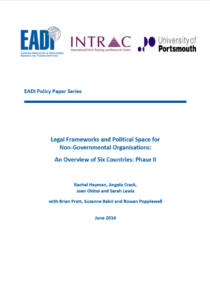There has been increasing concern to understand the realities that  affect how international and local NGOs operate in many countries. Globally, there is high-level agreement on the value of greater inclusion of civil society within policy-making processes, resulting in commitments to put in place an enabling environment for civil society to function. In some countries progressive legislation is being passed to facilitate this. However, in many countries legislation regulating the operation of NGOs is weak or poorly implemented. This often reflects wider social, political and economic constraints on citizens to express themselves and to hold state authorities to account. Throughout 2013 frustrations erupted in protests, sometimes violent, in many parts of the world.
affect how international and local NGOs operate in many countries. Globally, there is high-level agreement on the value of greater inclusion of civil society within policy-making processes, resulting in commitments to put in place an enabling environment for civil society to function. In some countries progressive legislation is being passed to facilitate this. However, in many countries legislation regulating the operation of NGOs is weak or poorly implemented. This often reflects wider social, political and economic constraints on citizens to express themselves and to hold state authorities to account. Throughout 2013 frustrations erupted in protests, sometimes violent, in many parts of the world.
This report examines the legal framework and real operating environment in six countries, selected by the German Ministry for Economic Cooperation and Development (BMZ) for study: Egypt, Kosovo, Myanmar, Peru, Rwanda and Vietnam. The report builds on an earlier study analysing Bangladesh, Ethiopia, Honduras, Kyrgyzstan, Serbia and Uganda.
Download:
Legal-Frameworks-and-Political-Space-for-NGOs-Phase2
.pdf (1.25mb)